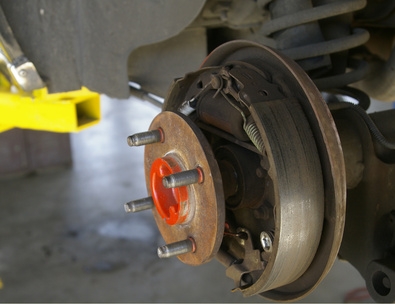
The health of your back brakes, or drum brakes, can affect the quality of your entire vehicle. If you don't take care of pulling, dragging, squealing or worn drum brakes, it can significantly affect the way your car drives, your gas mileage and your general safety on the road. While there are a couple of reasons your drum brakes may squeal, most likely you just need lubrication, which can be done at home.
You may be putting excess stress on your brakes without realizing it. First, make sure your parking brake is off. If you drive with the parking brake on, it will grind on the drum brakes, forcing them to pull, weaken and possibly make noise.
If your drum brakes are making a high-pitched squealing sound, it is likely they need lubrication. You can do this at home with minimum risk of ruining your brakes accidentally. Brake lubrication and brake cleaner typically cost $10 to $15 per bottle, and can be applied liberally to the drum brake. Because brake cleaner is toxic to humans, you will want to perform this lubrication in an open and well-ventilated area. Take apart the brake, apply the brake cleaner, apply the lubrication, then reapply the brake to the vehicle.
You may have a leak in your brake system. Typically, but not always, if you have a leak your warning light will come on. The leak may be occurring in any part of the brake system, including the wheel cylinders, brake hoses or calipers. Rather than replacing the drum brakes, the leaking component of the brake system must be replaced. The car is not safe to drive until this part is replaced.
If the sound is a combination of scraping and squealing, you likely have disc brake pads that are worn out. This is what most people take as an indication that a brake job is needed; in reality, this problem should be taken care of before your brakes make noise. Your vehicle is not safe to drive with worn brake pads as this problem may prevent your car from stopping when needed.